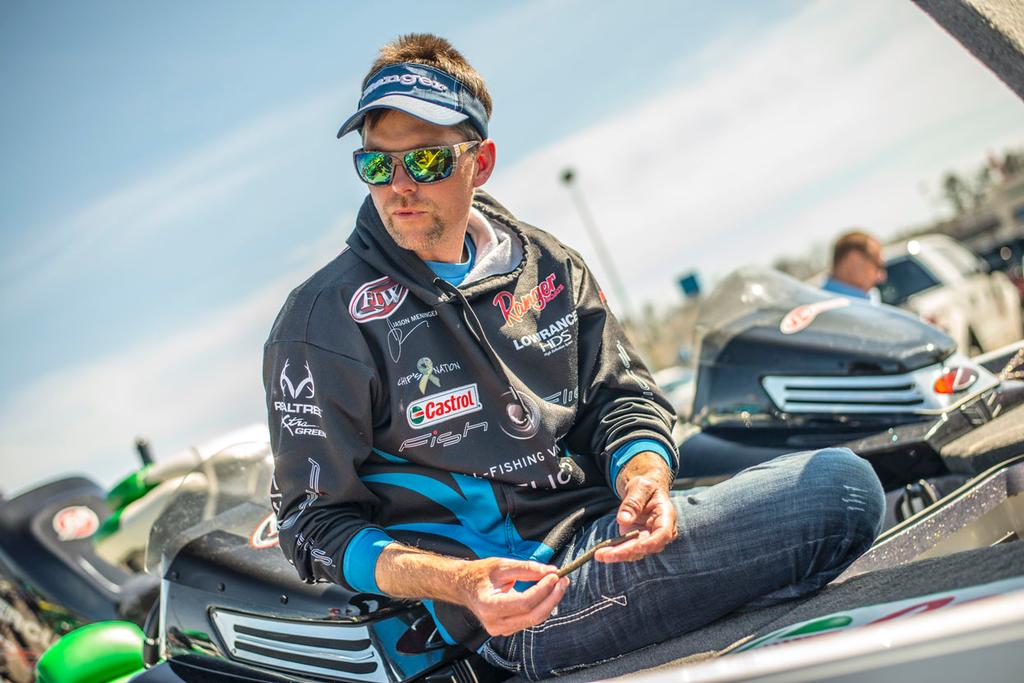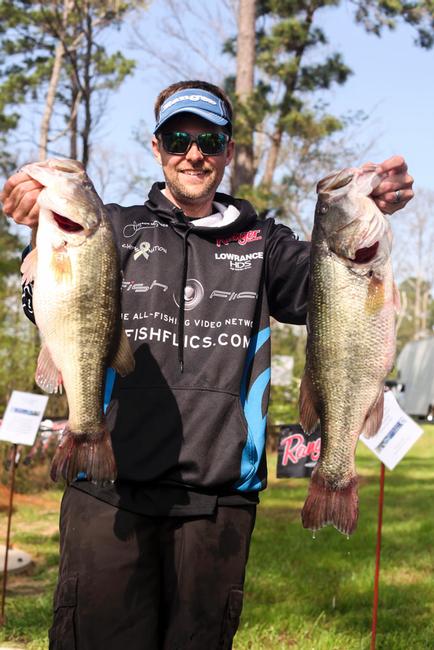Full-Time Business Pro

Updated: 11/11/14
Editor’s Note: The writer's opinions and observations expressed here are his own, and do not necessarily reflect or represent the views, policies or positions of FLW.
I consider myself a part-time bass pro and full-time business pro. My real day job is held down, not in my new Ranger Z520C, but in the offices of Adventure Advertising. As a partner in the agency, I work with leading outdoor industry clients like Lowrance, Z-man, Realtree and non-endemic accounts like Exmark mowers, helping them sell their products and services to the outdoor enthusiast marketplace. Many of the print ads, TV spots, social media campaigns and web videos you have seen from these companies are produced by Adventure Advertising. We also developed the fishing industry's first Internet-based video content distribution platform, FishFlics.com.
So, let's get down to business. There is a ton of outstanding fishing talent on Tour, but just being an exceptional angler will only get you so far in this sport. If you can't succeed on the business side or your last name isn't Morgan or Dudley, your career may well be short-lived. For those of you not interested in fishing for a living, I hope to give you an inside look at the business behind the sport we all love so much.
Professional fishing is a business and, like any business, is all about the numbers. So, let’s take a look inside some of the numbers. If I were to guess, I'd say that only 10 to 15 percent of the registered pros in a full FLW Tour field are truly making a living as a touring professional angler. If you cash a $10,000 check in every event, you will generate $60,000 in revenue. By all accounts, if you accomplish this not-so-easy task, you are headed to the Forrest Wood Cup (guaranteed $10,000 payout) and have had a season that will put you in the top 10 in the AOY standings.
Your $70,000 season sounds good, right? Well, when you add up entry fees, equipment, and travel expenses to fish a full season on Tour, you are in upwards of $40,000. That successful season would put your gross income for the year at a whopping $30,000. A closer look at the 2014 FLW Tour Angler of the Year standings revealed that only 20 of the 179 (11.2 percent) pros were able to hit the $70,000 annual tournament earnings mark and that 29 percent of the field won more than enough ($40,000+) to cover their annual expenses.
Most successful businesses have multiple revenue streams in place. If all of your revenue comes from one source and that source of income dries up, your business will likely become insolvent. So, if you want to keep fishing, you better have other sources of income in addition to tournament winnings.
 Let's take a look at some of the top pros on Tour to gain some perspective into how many – and what type of – revenue streams each relies on to keep a rod and reel in their hands instead of a pen or wrench. I interviewed past Forrest Wood Cup Champion, Luke Clausen, and former FLW Angler of the Year and Bassmaster Elite Series standout, David Walker, for their takes on the topic.
Let's take a look at some of the top pros on Tour to gain some perspective into how many – and what type of – revenue streams each relies on to keep a rod and reel in their hands instead of a pen or wrench. I interviewed past Forrest Wood Cup Champion, Luke Clausen, and former FLW Angler of the Year and Bassmaster Elite Series standout, David Walker, for their takes on the topic.
"Things have changed over the last 10 years," Walker remarked. "It's a lot harder to land sponsorship deals regardless of your results and I have to depend on tournament earnings more than I used to. For me, success on the water is critical." It changes from year to year, but 75 percent of Walker's earnings come from winnings and the remaining 25 percent are split up between tackle company sponsorships and consumer show appearance fees. Ideally, David would like to reverse this and become less dependent on tournament earnings as his primary revenue stream.
“Earlier in my career, the fishing part of my job was more important and most of my time was focused around being on the water competing,” Clausen remarked. “Now, I’d say it’s a 50/50 deal split between sponsor obligations and fishing. If you plan on making a long career of it, you want to get to where 50 percent of your income is coming from sponsor relationships.” Additional income opportunities to supplement Clausen’s tournament earnings include appearance fees, product deals and performance incentives, which represent 10 to 15 percent of his annual income.
Typical revenue streams for touring pros include sponsor revenue, product endorsement deals, licensing fees and appearance fees. These are the obvious ones, but many of these can be difficult to secure unless you've enjoyed a very high level of success on the water with Tour-level tournament wins and consistent top finishes.
I think the best opportunity to create multiple revenue streams is to look away from the obvious. Similar to fishing, the obvious patterns are always those that disappear as a tournament progresses. Everyone is fishing for the same fish and there are just not enough to go around. The less obvious patterns take more time to develop and require a strong work ethic, but are usually the ones that hold up the longest.
How to expand your revenue base
Here are some less obvious revenue streams to develop that will definitely help you expand your revenue base and add longevity to your fishing career.
* Start a business – Use your knowledge of the fishing market in combination with your other skill sets to build a business in the fishing industry. Start a guide service in your home state, or partner up with some of your pro buddies to start a tackle company (like Gary Dobyns with Dobyns Rods or John Crews with Missile Baits). If you are a good marketer, build a marketing and promotions agency (like Joe Balog with Millennium Promotions). If you are good with your hands, build a business blinging out boats and tow vehicles (like Elite Series angler and CS Motorsports owner, Britt Myers). Like many entrepreneurial bass pros, Britt uses his visibility on Tour to promote his business and generate more income.
* Corporate Entertainment – Now that the economy has begun to recover, many corporations outside of the fishing industry are using corporate hospitality to strengthen relationships with their key customers. This is a great opportunity to use your fishing knowledge and skills on the water to make extra money by putting together hospitality packages for business people that like to do business outside of the office. You are also putting your brand in front of decision makers that might one day be your sponsor. Adrian Avena, young-gun FLW pro, covers some of his tournament expenses by providing guided fishing trips to corporate clients wanting to fish some of the nation's premiere bass fisheries.
* Editorial Content – If you are a good communicator and didn't fail your English classes, you can become a paid contributor to the many websites and publications that serve the outdoor industry. You might have to start out writing for exposure only, but once your content begins to deliver a strong audience, paid opportunities will follow. In the meantime, you will have an opportunity to build your personal brand and gain exposure for existing or potential sponsors.
Start fishing in multiple revenue streams and always work hard in every area of your business. Those who do will have the best chance to succeed both on and off the water.
Until next time, good luck on the water and God bless!
Jason